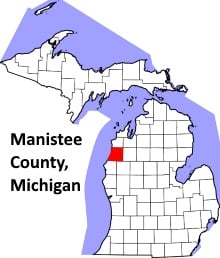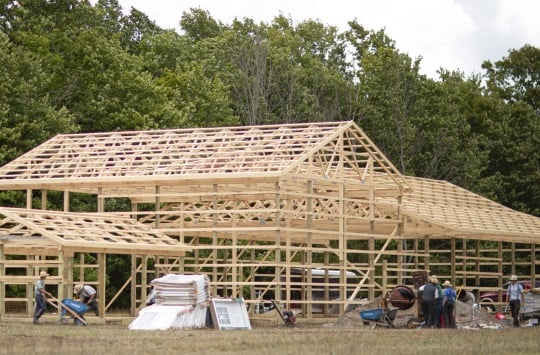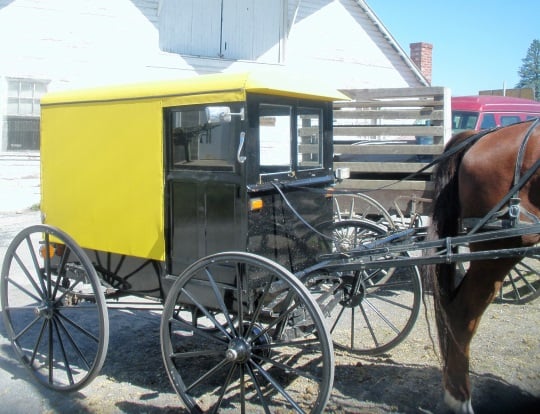Thoughts From 3 Amish Families In A New Michigan Community
Amish began moving to Manistee County, Michigan in the summer of 2018.
 A year later, there are nine families in this county which borders Lake Michigan, with more expected.
A year later, there are nine families in this county which borders Lake Michigan, with more expected.
In a nice article at the Traverse City Record-Eagle, three of those families share some insights on Amish life, and how they’ve adapted in the new community.
1. David and Barbara Hershberger
David is the bishop in this young community. He’s grateful for the concern by locals for his people’s safety.
The county road commission recently gave the thumbs-up to install 18 buggy warning signs. This will cost $6,200 (that figure jumped out at me – about $350 per sign).
David does carpentry work, and also has a kennel which breeds smaller dogs like pugs and yorkies.
Though the community has shown support for safety on the road, the code enforcement department is pushing for them to electrically wire their homes and buildings.
So while they’ve gotten backing in one area which reflects an understanding of their lifestyle, this other area might be a problem down the road.

David’s wife Barbara bakes bread, pies and other baked goods, which are sold at a farmer’s market.
The writer notices that Barbara appears to be pregnant, though in keeping with Amish form this is not discussed, at least not in the piece.
The couple have seven children. David would like his businesses to improve so his wife can stop with the baking, since she already has heavy mom duties.
Like with other Amish families, technology looms as an exterior danger, which could creep in.
“I’ve noticed in the younger generation that they’re constantly playing with their phones,” explains David. “It just kind of goes to show what we’d have if we allow it.”
He admits it can sometimes be a challenge. As a father and a bishop, no doubt he’s spent time thinking about this threat.
2. Perry and Rebecca Herschberger
Rebecca does most of the speaking here. Her husband Perry builds pole barns, and on Saturdays sells pies, rolls and cookies which Rebecca bakes, from a small stand in the parking lot of a local store.
The store’s owner built the stand, and does not charge the Herschbergers rent or any other fees from their sales. This seems like both a welcoming gesture, and a shrewd business practice.
“It draws customers. They’ve always got to have a beverage to go with their pie,” he explains. Seeing how people flock to Amish baked goods, I’d say it’s a wise move. The Herschbergers “sell a boatload” every Saturday.
Rebecca is mother to six children:
Rebecca’s greatest hope for her children is that they learn how to live with God, to have a happy family and to live near their parents so they can gather for meals. She also hopes they are content.
“We pray for them and just hope they will be satisfied with the way we teach them,” Rebecca said.
I read this as saying they hope their children will choose baptism and be content in an Amish Christian way of life. Something many, if not most Amish parents feel.

She is sometimes concerned by her people not living up to the expectations some might have of them. “I would not want people to think we’re perfect and be dissatisfied with us because we do make mistakes.”
A good reminder that the Amish are human…and another sentiment I’ve found you’ll hear often from Amish people when the topic arises.
3. Aden and Dora Miller
The Millers have the largest family of the three – nine children, aged 13 months to 15 years.
Aden runs a sawmill, and had been buying wood from this area. I read this as a hint as to how the settlement may have started.
Amish sawmill owners may buy wood in a sizeable radius from their home community (see this book for more). The Millers came from the area of Stanwood, MI, about 90 miles away. Aden says he found land prices in Manistee County to be reasonable.
So the area got on his radar via his business. It’s not stated outright, but it may be via Aden’s wood buying that the community was founded. Or, he simply may have become aware of a fledgling community that happened to be starting up in an area where he happens to buy his timber.
Aden’s other comments mainly suggest that the locals have been very welcoming.
Once, a stranger stopped to help after his children were out in the buggy, and the harness broke. Another time someone drove by the buggy, and shouted a friendly welcome through the window.
Aden also values the efforts of the county in putting up the signs: “They are concerned with us being out on the road and we appreciate that.”
Amish expanding in Michigan
This was a really nice look at the settlement, and kudos to reporter Patti Brandt Burgess for getting good input from multiple families. I recommend reading it in full, at the link at the top.
Amish continue to find Michigan an attractive place to live.
There are currently over 16,000 Amish in the state, spread over 50 settlements. Most of those are similar in size to this one, having just one or two churches.
In fact, the Manistee County settlement is one of at least 10 new communities founded in the Great Lakes State in just the past five years.







My thoughts regarding this article:
I am a born again christian living in Florida and would love to learn more about Amish beliefs.
Personally, I would be honored to have Amish neighbors and friends. I am told that they don’t trust or care the English and I get that. I’m English and I don’t care for many of us either.
Is it possible to become pen pals with Amish women of my age (65)?
Also, do you know how many communities in Florida?
I very much enjoyed reading this article.
Debra, glad you enjoyed it. There is just one community in Florida, in the neighborhood called Pinecraft (Sarasota area). It’s unique among Amish communities, this article explains why: https://amishamerica.com/florida-amish/
It’s possible to find a pen pal, but based on the requests I see on the site here and in my inbox, they are in high demand 🙂 I usually recommended trying to meet an Amish person in person first, and become their acquaintance or friend. You might also write in to an Amish correspondence paper about it.
Pinecraft
Check out Pinecraft in Sarasota. That’s where many many Amish spend time in the winter. Der Dutchman is a great restaurant in the area.
Pinecraft
Anita, Thank you for the response.
New MI Amish community
Oh no, not another puppy mill!!!
How do you define “puppy mill”?
How I define puppy mills
Erik-I define puppy mills as any enterprise in which dogs are bred to make money, over and over, and in unhealthy conditions. i.e. dogs are forced to live and breed in kennels all their life; Kennels are not large enough; those kennels are in the elements: hot summers and cold winters, with little real shelter from those elements; their food and water bowls are filthy; there is very little interaction between the breeder and the dogs. I’ve seen those puppy mills on more than one Amish farm in Michigan. I’ve seen the dogs. Most are miserable. Puppies are taken away from their mother too early and sold at farmers markets. There, they are left in the sun without water or shade. in small cages with barely enough room to move. I know of several people who have bought puppies from Amish mills that were sick and died. Am I saying all Amish breeders are bad? No, I am not, but, I’ve yet to see one that wasn’t. Breeders in general do not do kindly by their dogs. Amish are not renowned for treating their animals with love and compassion. We have way too many homeless dogs as it is. I volunteer at a shelter and it is heartbreaking to see how many dogs are brought in because of irresponsible owners! I am against ALL breeders; Amish or not.
Dog breeders are committing a sin for money
Couldn’t agree more, Janice.
Thanks for your reply, Janice.
So if I understood correctly, one main issue here is that you are against the general breeding of pedigree dogs.
I can respect that, especially as you say there are many lovable pets left to live in shelters, which suffer, and worse.
The thing is, people are still going to want pugs and poodles and all the the other pedigree dogs.
I think you can work on reducing people’s demand for this, maybe through public information campaigns, etc? (though I’m not optimistic it will do much – people love these breeds).
In the meantime, I think putting all breeders in the “bad” box – correct me if I’m wrong but that’s how I understand the gist of your message (you write at the end you are “against all breeders”) – I don’t think is productive.
I was asking you that question to try to define the difference between someone who raises these breeds in a healthy way and those who do not (I think we know the obvious egregious examples of “puppy mills”, but beyond the squalid and horrific examples, when you have dogs that are raised without health problems and otherwise are physically healthy, are those still bad situations? I am still unclear as to the type of care and attention a young dog actually needs and receives, and as to what constitutes a “healthy dog”).
In other words, what does the picture of a “healthy breeder” look like? (or we can use another word besides breeder if need be – “dog-raiser”?) What do the dogs need to have to make sure they are healthy and well-adjusted?
I think it might be more productive for the animals’ welfare to distinguish between “bad” and “good” breeders, and give credit to those who breed and raise their animals well (whatever that entails), so that the pedigree dogs that people are going to demand and buy anyway come from good sources, and that those good breeders are encouraged to succeed.
Meanwhile you can also work to promote shelter dogs who need homes too. I don’t mean to be pessimistic, but I am skeptical that you’d be able to significantly reduce the public’s desire for pedigree dogs if that is your goal. These breeds have been a part of people’s lives and consciousness for generations. But maybe promoting shelter dogs as an alternative will get people to consider one of them over a “designer” dog. Perhaps after much effort and time, things might move in that direction.
Dog breeding vs dog raising
Erik,
I would never consider a dog breeder, be he/she a good or bad one, a dog raiser. Breeding dogs for profit is not the same as raising dogs. There are specific pure breed rescues all around the country. One can find almost any breed if one were to do a search for them. I realize that there are some people who want a specific breed and I understand that. To a point. If one truly loves dogs, one should seriously consider adopting rescue pure-bred before buying one. There is a difference between adopting and buying a dog, hence the slogan: “Adopt don’t shop”. I am against breeding of any kind; good or bad. The world just has too many homeless dogs/cats. Including pure-breds. I strongly suggest you become involved with a rescue or volunteer at a shelter for a short while. You will eventually lose sympathy for those people who only want a dog from a breeder. I understand that many people are afraid a shelter dog will have issues. Some do; most don’t. Once they are in a loving home, they can be helped with proper training, love and patience. I have seen it and experienced it. Licensed breeders are not checked by the USDA on a regular basis. The USDA does not make random visits to licensed breeders, let alone, breeders in general, to ensure proper breeding practices. Let us not forget the one thing that motivates all breeders: profit. Whenever profit is the motivating factor, especially for people who have little to no respect for animal rights in general, bad things happen to those animals. If you think it is okay for a dog to spend its life locked in a kennel, (a kennel regardless of size, is just a cage,) never being walked or played with, its only human interaction being feeding time and the cleaning of its cage, and that’s in a “good” breeding facility, then you really do not understand animals’ needs either. I not only volunteer at my nearest animal shelter, I also donate to several animal rescues here and abroad. If you saw what I see on a regular basis, you would be horrified! Yes, some people want a specific breed, and yes, many people prefer the smaller dogs. Do you know that the two breeds most surrendered or abandoned are the pit bull and the Chihuahua? Yorkies are not that far behind! People want the pit bull for status and the Chihuahua for its cuteness. When they realize they have to actually train both breeds, one, because it is so strong, and the other, because it can become an annoying yapper, they lose interest and dump those dogs. That is if the dog was lucky enough to not have been abused and neglected before being dumped! Just as life in a breeding program is no life for an animal, life in a shelter is not a life for an animal either. It is scary, loud, depressing, and traumatizing. Then there is the problem of bad shelters, with bad managers, and terrible employees. To make my long story short, yes, I am against all breeders until such time, shelters are no longer needed because of people who, while they may love their specific pure-bred, that does not mean they care about the problems they are perpetuating when they buy from breeders instead of breed-specific rescues. In the past week alone, a couple of breeders were arrested for their criminal breeding practices. At my shelter, as I write, we have a small female beagle. She is the sweetest little girl ever. She was used for breeding and then dumped when she was no longer useful. We have 10 pit bulls. All were dumped or surrendered when they could no longer breed or had become a handful. One little girl who was just adopted this weekend, had been at the shelter for almost three years! What took so long for her to find a home? She was a black dog. Black dogs and cats have a very difficult time getting adopted. I could go on about life in a shelter for dogs and cats, and I know that I won’t change the minds of people who want what they want regardless of the repercussions to the rest of the canine population.
thank you for helping shelter animals
Thank you for helping shelter animals. It’s a good reminder to try to adopt not shop. Currently there are some shortages in my area of certain types of dogs people are looking for, but all it takes is transport to move animals from an area with too many in need of homes and that situation is remedied. I hope that there is a national network to help move dogs from areas of overabundance to areas of demand. Even cross-border.
Amish breeders
Yes, there are a few transport people around the country and they do cross state lines. We have people who transport dogs/cats from Texas up to Colorado several times a year and monthly after puppy/kitten season. There are some transporters who go from the South up to the Midwest and East Coast. Rescuers and shelters are always looking for transporters and fosters. There aren’t nearly enough!
Never saw an Amish Breeder that did not abuse the animals
I volunteer for a rescue and I’ve seen the horrible results of how the Amish breed dogs. I’ve picked up sick dogs. Dogs that are crippled from being in small cages. We are never told in advance of any illness the dog may have. Sick Dogs that pose a risk to humans as well. We take the dogs anyway because we know they will shoot them. I’ll never spend another penny in any Amish business.
Absolutely horrific and disgusting.
How Amish treat dogs & animals in general is a sin
Thank you very much for telling the truth.
There needs to be a lot more law enforcement against this abuse since they clearly won’t stop.
Amish dog breeders
Marla,
I agree with you. Radical Christians believe that God gave them dominion rather stewardship over the planet and all who/what live on it. I volunteer at a Christian non-profit. The stories they tell while laughing, about how they recently shot an animal that had come onto their property uninvited… They shoot deer, raccoons, opossums, turkeys, birds of every kind, in and out of season. They don’t care. If the animal annoys them, they shoot it!
animal rescue?
Deborah Corry, please let me know which rescue you participate with, if they have a webpage, etc. I might want to support in some way. marlajns@yahoo.com
Amish dog breeders
Deborah,
I have experience with the same miserable conditions you have. It isn’t just dogs/cats they treat poorly, it’s also their chickens and ducks! The law steps in from time to time, but the penalties are rarely severe enough to deter abusers. Part of the problem stems from most shelters being overcrowded and not enough foster homes. Another reason that the Amish don’t suffer serious consequences is that too many people put the Amish on a pedestal and don’t want to believe that they abuse animals. If they don’t see it, it doesn’t happen.
People who love the Amish and their lifestyle don’t appreciate it when others aren’t impressed. Having said that, I am on friendly terms with several Amish families who live near my community. We talk whenever we see each other. I buy my eggs from them because they allow their chickens to roam the farm during the day and lock them up in a nice coop at the end of the day.
I agree
I am sickened to know that the majority of puppy mills are in the Amish communities. They are supposed to be people of God though they abuse his beautiful creations for their own profit. Disgusting.
Judgement
If you add “Hope not another …” most would agree. However to evaluate and define as a puppy mill without first hand information is waton slander and gross generalization. Now I will take the 2×4 from my eye.
Judgement
Glasshouse: Wanton slander? Gross generalization? Are you presuming I don’t have first-hand knowledge? I hope that 2X4 wasn’t too difficult to pull out of your eye!
Dog breeding should be illegal while shelters are full
Breeding dogs and cats is a SIN when adoptable animals are being put down by the millions yearly in this country. It is everyone’s responsibility to adopt rather than shop for a pet, and to spay and neuter pets, strays, and ferals in their neighborhood. To breed animals for money while adoptable shelter animals die for lack of homes is, again, I will say it, a sin. A grave sin.
The Amish are one of the main groups in the US breeding dogs for money. The puppy mill problem ties in undeniably with Amish.
The way to end the problem is to refuse to buy dogs for money, from anyone, for any price.
Dog breeding should be illegal while shelters are full
Marla Jones: I couldn’t agree with you more! As I wrote in another post, I volunteer at a shelter and am heartbroken every time a dog or cat is brought in, either through surrender, or because they were found wandering the streets. Luckily this shelter is “no-kill”. Michigan claims to be an “all no-kill shelter” state. Even so, life in a shelter is no life for those dogs and cats. One of the Amish settlements nearby, was the hub of a dog breeding scandal a few years ago. Some Amish were actually arrested for poorly managing, abusing and neglecting the dogs they were breeding. The place was terrible, yet, the arrested denied any wrongdoing even though it was plain to anyone with even the slightest bit of compassion, that those dogs were suffering. I sense from some posts, a naïvete on the part of “Englishers” regarding the Amish and their lifestyle.
Re: dog breeding
Janice, you and I are in complete agreement. Feel free to keep in touch. I’m on Facebook as Marla Maye, a pencil self-portait I drew at age 3 is the picture. marlajns@yahoo.com
I think a large part of the reason the Amish don’t care for their animals the way modern “English” do is because of a difference that’s way down the base of their Cultural Icerberg (Google “cultural iceberg”). A paradigm/lifeview based on hierarchy and dominion over things rather than stewardship. Man at the top, women , kids, animals, and environment below. Amish are known for not being very kind to animals, wives, kids, or land. The ones who are, it’s considered a new thing or an evolution/improvement in thought and awareness, and I commend them for that.
In touch
Marla,
You are probably correct. That, of course brings us to one of the many disturbing aspects of religious fundamentalism. I will look you up on FB.
Looking for pup
We purchased a dog from an amish farm near reed city three yrs ago and he is a perfect dog! Can yu help me find this seller to buy another? I don’t remember where they lived
Name is Linus Gengerich?